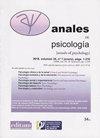厄瓜多尔对与饮食行为障碍相关的危险因素量表(EFRATA)的调整和验证
IF 1.3
4区 心理学
Q3 PSYCHOLOGY
引用次数: 0
摘要
这项研究的目的是适应和了解厄瓜多尔人口中与饮食障碍有关的危险因素EFRATA量表的因素结构和可靠性。使用了1172名参与者的非概率样本(年龄:M=21.99;SD=2.49;58.6%的女性和41.4%的男性)。第一项平行分析研究确定了解释50%差异的七个可解释因素。第二项确认性因素分析研究表明适合度可接受(GFI=0.96;AGFI=0.95;NFI=0.94;RMR=0.08)。Cronbach's Alpha和McDonald's Omega的可靠性系数分别为0.89和0.90。厄瓜多尔版的EFRATA表现出良好的心理特性,并适应了该国的文化背景。这项研究的目的是调整和了解与饮食行为障碍相关的危险因素EFRATA量表在厄瓜多尔人群中的因子结构和可靠性。使用了1172名参与者的非概率样本(年龄:M=21.99;DT=2.49;58.6%的女性和41.4%的男性)。第一项平行分析研究确定了7个可解释的因素,解释了50%的方差。第二项验证性因子分析研究表明,调整是可以接受的(GFI=0.96;AGFI=0.95;NFI=0.94;RMR=0.08)。Cronbachα和McDonald's Omega的可靠性系数分别为0.89和0.90。厄瓜多尔版的EFRATA表现出良好的心理测量特性,并适应了该国的文化背景。本文章由计算机程序翻译,如有差异,请以英文原文为准。
Adaptación y validación ecuatoriana de la Escala de Factores de Riesgo Asociados a los Trastornos de la Conducta Alimentaria (EFRATA)
The objective of this study was to adapt and know the factorial structure and reliability in the Ecuadorian population of the EFRATA Scale of Risk Factors Associated with Eating Disorders. A non-probabilistic sample of 1172 participants were used (age: M = 21.99; SD = 2.49; 58.6% women and 41.4% men). The first parallel analysis study identified seven interpretable factors that explain 50% of the variance. The second confirmatory factor analysis study indicates an acceptable fit (GFI = 0.96; AGFI = 0.95; NFI = 0.94; RMR = 0.08). The reliability coefficients for Cronbach's alpha and McDonald's omega were 0.89 and 0.90 respectively. The Ecuadorian version of the EFRATA shows good psychometric properties and adapts to the cultural context of this country.
El objetivo de este estudio fue adaptar y conocer la estructura factorial y la confiabilidad en la población ecuatoriana de la Escala EFRATA de Factores de Riesgo Asociados a los Trastornos de la Conducta Alimentaria. Se utilizó una muestra no probabilística de 1172 participantes (edad: M = 21.99; DT = 2.49; 58.6% mujeres y 41.4% hombres). El primer estudio de análisis paralelo identificó siete factores interpretables que explican el 50% de la varianza. El segundo estudio de análisis factorial confirmatorio indica un ajuste aceptable (GFI = 0.96; AGFI = 0.95; NFI = 0,94; RMR = 0.08). Los coeficientes de confiabilidad para el alfa de Cronbach y el omega de McDonald's fueron 0.89 y 0.90 respectivamente. La versión ecuatoriana de la EFRATA muestra buenas propiedades psicométricas y se adapta al contexto cultural de este país.
求助全文
通过发布文献求助,成功后即可免费获取论文全文。
去求助
来源期刊

Anales De Psicologia
医学-心理学
CiteScore
3.30
自引率
5.90%
发文量
57
审稿时长
4-8 weeks
期刊介绍:
Anales de Psicologia / Annals of Psychology is a multidisciplinary journal of the various thematic areas of scientific psychology. It publishes original research articles and theoretical review in any of its basic, applied and methodological areas included within psychology.
Publishing, financing, marketing and distribution corresponds Editum: Editions of the University of Murcia (Spain). The organizational guidelines and editorial policies come from the Editorial Team (elected for four years by the Areas and / or Departments of Psychology at the University of Murcia) and the Editorial Board, composed of scholars and experts from different universities and institutions national and international. It is published in print (ISSN: 0212-9728) since 1984 and in Internet publishing (web) (ISSN: 1695-2294) since 2000. Available online full text in pdf from the vol. 1 1984.
Anales de Psicologia / Annals of Psychology maintains a system of exchange with other journals and publications of psychology in the world. Through an free exchange agreement with their respective publishers or entities responsible for editing, these journals and publications are received at the University of Murcia (Biblioteca "Luis Vives", near the Faculty of Psychology) and in return, our journal is sent to libraries and educational and research institutions such centers responsible for editing.
 求助内容:
求助内容: 应助结果提醒方式:
应助结果提醒方式:


